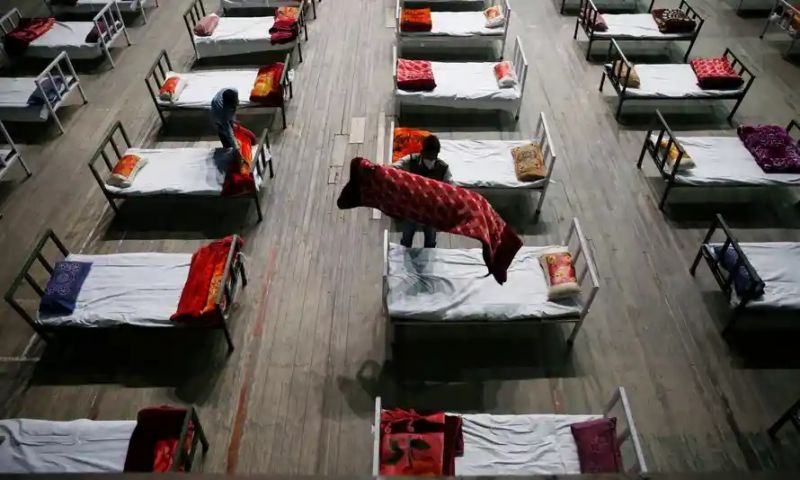
My chat groups from India are flooded with requests for convalescent plasma, Remdesivir, oxygen tanks and hospital beds. My Twitter feeds are condolences or desperate cries for help from people whose loved ones are fighting for their lives.
Here in Melbourne, I feel so helpless. I offer any help that I can to those in the country of my birth, from half a world away.
I call a friend who works in dental healthcare in India’s capital, New Delhi. His voice is heavy. He says he was recently called to assess someone in his neighbourhood who was possibly dead. After initial resistance he was forced to go as every doctor they called refused to attend.
He donned two masks, locked his little children in the house on their own and went to check the person lying on the floor a few houses away. The body had no pulse and the hand was stiff and cold. The pulse oximeter showed no activity and the eyes did not respond to his phone torch.
He asked the relatives if the person on the floor had Covid. The relatives didn’t know. All they knew was he was asthmatic and collapsed.
He advised them to call a doctor or an ambulance but they refused.
“We can’t as they will do a Covid test and won’t release the body for days. Can you please declare him dead so we can perform the last rites?”
My mum tells me that there are long queues outside my city’s cremation ground. The pyres haven’t stopped burning all day.
An aunt has told her that the bodies are being cremated by the sides of the road. There is no other way.
An acquaintance in another city tells me her relative in hospital who was being treated for Covid was dead for a week before someone informed the family.
My nieces and nephews have not been to school for more than a year. The way things are going they will not physically be in class for a long time. A friend’s son calls Covid a “Rakshas” – meaning demon in Hindi. Kids in remote India have no access to the internet, so no access to education for more than a year.
I don’t know anyone in India whose family does not have a Covid-positive member.
Non-Covid patients are dying as there is no space in the hospitals to treat them. The emergency departments are filled with beds on the floor and Covid patients struggling to get care.
My uncle is a physician in a busy city hospital. He tells me that the situation is so bad that they might have to roll out beds on the streets. Every friend in India has said one thing to me: “The situation is really bad. Please pray for us.”
My mum, an ardent “bhakt” (devotee) of prime minister Narendra Modi, is disillusioned for the very first time in the past seven years of his regime.
My family is ideologically divided. Dad, a fearless journalist, has been reporting to hold those in power to account. Mum is a conservative who will not listen to a word against Modi. But the lack of empathy and the shambolic management of this crisis has changed her mind.
This is a big deal. Previously, nothing could shake her belief. Not the poor execution of demonetisation – a drastic measure that was implemented to remove the legal tender status of rupee – or India’s increasing unemployment rate, or the falling gross domestic product, or the opaque army activities to retaliate against the alleged attacks by India’s neighbour Pakistan. She defended Modi’s every action.
But she can’t reconcile this. Modi’s government won’t take responsibility for the chaos created by this surge that has already taken more than 200,000 lives. Instead, Modi a few weeks ago applauded people who showed up at a pre-election rally in the eastern state of West Bengal.
My dad is too grim to have a dig at my mum. He tells me not to worry. I can hear the sadness in his voice. Some of his journalist colleagues, childhood friends and acquaintances have died in the past few months due to Covid.
While some people rejoiced and celebrated, attended rallies, wedding parties and religious gatherings prematurely in India, my parents stuck to their regime of exercise, good diet, social distancing and isolation.
But I am not sure if this will work now, against this inescapable Covid tsunami.
I try hard to focus on my job. It was relatively easy when I was in the thick of it last year. I was struggling as well. I was living under a lockdown too. The collective suffering somehow lessened the burden and the longing for a family reunion. But it is hard now. Do Australians realise their privilege?
What’s happening in India is a wake-up call for people complaining about wearing masks and missing out on holidays or refusing to get the vaccine.
The Australian government has the luxury of time, space and resources to do what India didn’t. To vaccinate the entire population, to fit-test the N95 masks for all frontline workers, to implement measures to stop the airborne spread of this deadly virus and to strengthen the system. It could easily crumble if we faced even a tenth of the catastrophe India is facing. This is not the time to be complacent.
I wake up each day hoping to hear something better from the country of my birth, and my adopted home. One facing the consequences of its own doing and the other one about to if it doesn’t learn from the mistakes.
Krati Garg is an oral surgeon and a freelance journalist.
